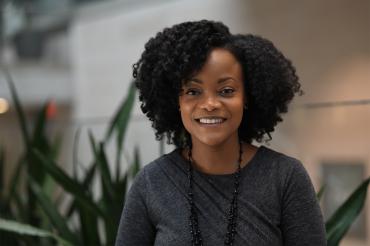Rethinking health care: U of T researcher wants to broaden medicine's foundational knowledge

Published: February 17, 2021
Nicole Woods wants to see more expertise from fields beyond the basic sciences incorporated into medical education.
Traditionally, the study of medicine has focused heavily on disciplines like physiology, biochemistry and anatomy, says Woods, an associate professor in the department of family and community medicine in the Temerty Faculty of Medicine at the University of Toronto. Though it’s a strong foundation, she believes it could be enhanced with a greater emphasis on knowledge from fields like psychology or anthropology.
In her role as the Richard and Elizabeth Currie Chair in Health Professions Education Research at the Wilson Centre – an appointment she began on Jan. 1 – Woods works to embrace multiple disciplines and rethink what kinds of knowledge are viewed as foundational to practise medicine.
“If the role of basic science is to help you understand ‘why’ – which is what my research shows – any form of knowledge that helps people understand why they do what they do could be considered a ‘basic science’ and could be foundational to medicine,” says Woods, who is also the Wilson Centre’s associate director of operations.
Woods sees opportunity to incorporate understanding from other disciplines into medical education. She’d like other disciplines to play a greater part in shaping training for future health-care practitioners.
“What about integrating the behavioural, cognitive or social sciences? If you have a physician who has a really good understanding of social dynamics, sociology and other areas like these, how would that change what they do with their patients tomorrow? That’s a big opportunity for us,” she says.
Woods, who is also the director of the Institute for Education Research at University Health Network, holds a PhD in cognitive psychology. Her work focuses on human memory and categorization.
Just as Woods’ work broadens the range of subjects that could be considered essential to medical education, her Excel Lab attracts students from a similarly wide range of programs. The lab works to develop new ways of thinking about how to design curriculum and teach future health-care providers.
Graduate students in the lab, which Woods leads with Associate Professor Maria Mylopoulos, come from disciplines that include dentistry, pharmacy and audiology.
Academic diversity is one aspect of work that excites Woods.
“We’re all working to develop models of expertise and ways to build experts, so I get to collaborate with people who I wouldn’t have a chance to interact with in a siloed program where everyone is in a single field,” Woods says.
“This work speaks to people across many professions. Cognitive psychology is about the everyday human experience and reasoning. And when people enter professional programs and move into the professional realm, their minds don’t fundamentally change. They just think about different things. So, as long as I’m studying the process of thinking, I can talk to anybody. And it’s a lot of fun doing that.”
In addition to expanding the scope of health professions education research, Woods is also working to make the field more inclusive.
“It’s important for young Black people to see that science is possible for them. I want to create space for them to be here with me,” says Woods. “That’s part of my idea for the chair. I hope down the line there will be young Black men and women who know this is an option for them as a career – that they can be an education scientist or an institute director. We can be leaders in science and medicine.”
The inspiration for a career in education scholarship was sparked by one of Woods’ PhD supervisors – and current colleagues — Geoff Norman, a professor of clinical epidemiology and biostatistics at McMaster University and affiliated scientist at the Wilson Centre.
The two met when Woods was a third-year undergraduate student in one of Norman’s classes at McMaster. He quickly noticed Woods’s talent and asked her to do an independent study in his lab.
Norman says he was not surprised to learn of Woods’ appointment to the Currie Chair.
“In graduate work, students often follow the lead of their supervisor and create studies that are an extension of the program. Dr. Woods really opened up a new line of research that she has continued to the present day,” Norman says.



